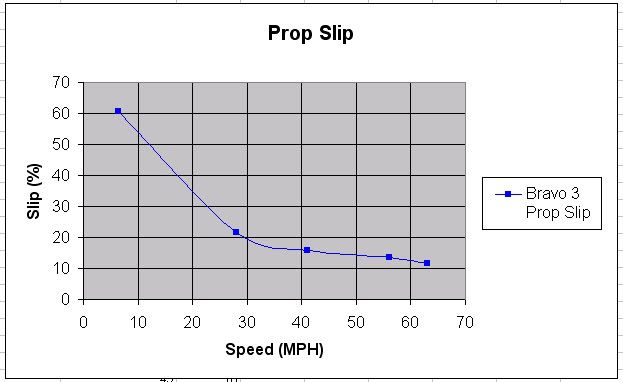Re: why don't boats have transmissions?
As many of the posters above have stated, the propeller slipping in the water acts like a transmission in a boat. No need for any additional weight or mechanical complexity to replace something that's free!
This chart is from my boat, but it will be very similar for any planing hull.
As you can see, up until about 30 MPH the slip is acting similar to a CVT (continuosly variable-ratio transmission). It's allowing the motor to rev up to reach the point where it can supply the power needed to drive the boat at that speed. If the prop WASN'T slipping, it would be like trying to drive your standard transmission car locked in 4th gear with the clutch permanantly engaged. If the prop couldn't slip, you would need a transmission in the boat just like you do in a car.
To make the power required to drive a typical boat, the engine is big enough (displacement) to have a broad enough torque curve that a transmission is unnecessary when combined with the prop slip.
Some specialized boats do use transmissions. I believe the 100+ MPH ski-racing boats do. This is because the engines are tuned to deliver lots of horsepower within a narrow RPM range (peaky torque curve). So the transmission allows the engine operate within that RPM range.
If your boat is propped right, the engine RPM will be so close to where you want it to be when cruising (for efficiency and power purposes) that a transmission is unnecessary. For example, at 60 MPH my Suburban is turning about 2200 RPM towing my 5000 lb boat. An additional gear wouldn't do me any good because the engine couldn't pull it. My boat turns 4600 RPM at WOT (4400-4800 recommended), and is turning 2200 RPM at 28 MPH, which is it's maximum efficiency cruise speed. A transmission which would allow me to lower the RPM would be equivelent to an additional gear on the loaded Suburban. All it would do is lug the engine.
Be kind of funny to put a small displacement, peaky (narrow RPM range where it makes HP) motor in a boat. You'd need a transmission in that case to allow the engine to operate at the RPM where it made the required power. Kind of like riding an old (1970's) CR125 motocrosser ...... talk about "rowing the gears"........
Kind of a rambling post, hope it makes sense!!






















